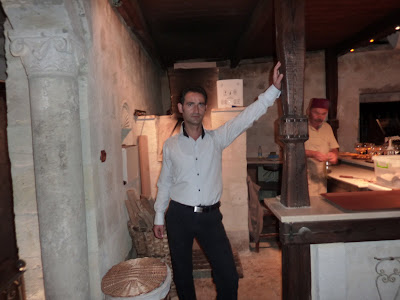So then what? What do you do when you’re alone in your cave room past midnight in the middle of Turkey and you’ve just been stung by a scorpion? You FREAK THE HELL OUT. I threw on a dress, my glasses and a pair of sandals and ran next door to where Pinar lives with her mother and proceeded to pound on their door like Armageddon was upon us. Fortunately, Pinar’s mother is one of those unflappable types that answers the door at 1am with as much equanimity and good cheer as she does at noon. She brought me inside, and after I’d shown her my evidence (the scorpion’s crushed carcass now wrapped in an empty box of gum) proceeded to laugh and tell me that everything was “tamam, tamam” (meaning “no problem”). I was still FREAKING THE HELL OUT, though, not sure whether or not she realized that the scorpion had STUNG ME TWICE or that, before I scraped him along the floor, he had been about four times the size as the admittedly puny looking thing I was now holding. (She kept telling me it was OK, because it was just a baby, but what if it wasn’t actually a baby???) And where was Pinar during all this uproar? My dear, calming, English-speaking friend Pinar? She was asleep in the next room…but she’d been so exhausted that night that she told her mom not even to wake her up at three for the standard pre-dawn Ramadan meal; I think my case did not merit overriding her request. Anyway, noting that my panic wasn’t abating in the least, and probably just to make me feel better, Pinar’s mother agreed to call Apo, one of the night guys at the hotel, to take me to the hospital in Nevsehir, the big town nearby. (There is one small clinic in Goreme, but it’s the kind of place that isn’t open on weekends and is closed from 11am-2pm for lunch. Inside the décor is sort of sweaty and tropical, with yellow and peach colored walls, wet tile floors and a great profusion of spider plants and bougainvillea trees. When I went to have my ear examined, there was a group of about twelve old women in scarves and old men in woolen vests just sort of clustered around the one doctor’s office, the door to which remained wide open even as she was examining patients…whenever someone came out, a new person would go in, but if there was any order to who went next I certainly couldn’t discern it. When I did finally manage to get in, she took about 15 seconds before declaring my ear to be “dirty,” writing me a prescription, and sending me on my way.)
The drive to Nevsehir is about 20 minutes, and Apo doesn’t really speak any English, which gave me free reign to indulge in my panic. Does scorpion venom cause you to go into cardiac arrest? I could suddenly feel a certain tightness in my chest. Or wait, why was the back of my head beginning to tingle? Can poison penetrate the blood-brain barrier? Was I going to go crazy? Maybe blind! Or maybe my face and right hand would become permanently paralyzed, and I’d only ever be able to communicate again using shaky, left-handed script.
Well, it turns out that while the pain was real the threat was not. (Are you shocked? Everything really was “tamam.”) Remember what I said about the threat to my life? Absolutely not. Apparently stings from the species of scorpion that live in Goreme are really quite harmless; they basically just really, really hurt for about a day and not much else. When I got the hospital the nurse sort of unceremoniously gave me two analgesic injections, one on either side of my rear, so that instead of hurting in two places I hurt in four. I say “unceremoniously” only because she didn’t bother with any of the niceties that usually accompany injections, like disinfectant, or any sort warning that I was about to get an injection at all. Just bam! needle in, needle out. Then, as I was recovering from the surprise, bam again! Actually, it was a kind of busy night at the hospital—apparently in addition to more road rage and traffic accidents than at any other time of year, Ramadan is also the occasion for a huge spike in hospital admittance. There were all these sort of dazed-looking men wandering the halls, holding aloft with their right hands the rehydrating IV drips attached to their left.




























